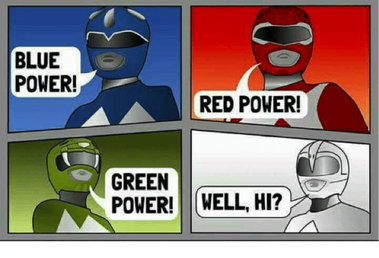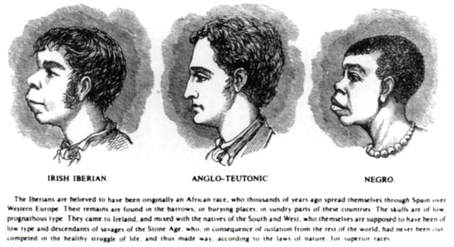 By David Barr White people often get defensive in conversations about race because it can feel to us like being white is always a bad thing. We have to be apologetic: whiteness is something to be ashamed of, not to celebrate. This can seem unfair. Because of this, you often hear people say things like, “If black people can have their own parades/awards shows/advocacy groups/TV networks/whatever else, why can’t we?” The problem with this question, as with much problematic racial thinking, is that it looks at the different races as if they are neutral and natural categories instead of divisions invented for a purpose and which have significant histories. Our racial labels are not equivalent to each other precisely because they were created for that specific purpose (other countries with their own racist purposes, like South Africa, created different categories). Blackness was a legal and political category created to enslave and exclude. To celebrate blackness is thus to appropriate a label meant for harm and to make it into something good. It is to celebrate the way in which a people have taken their oppression and turned it into beautiful art, music, and literature. There is nothing about that effort that makes it racist or exclusionary. Celebrating whiteness is different because its history is different. There are dozens of books and articles about the origins and growth of the category ‘white’ in America.[1] I won’t bore you with the details here, but you should read at least a summary at some point. Here are some highlights: during the colonial era, it was deemed necessary to define ‘white,’ ‘black,’ ‘mulatto,’ and so on, in order to designate who had rights and privileges and who did not. Within the larger category ‘white’, it remained common until the mid twentieth century to talk about categories like ‘Irish,’ ‘Saxon,’ ‘Italian,’ or ‘Jewish’ as separate races. Some of these races were considered more or less ‘white’ than the others and the less ‘white’ ones faced real racial prejudice (especially and most obviously Jewish people). However, by the middle of the twentieth century, racial lines had been redrawn around only a few major groups (‘black,’ ‘white, ’ ‘Asian,’ etc.). Let's think for a moment about why people would want to move away from ‘Irish’ or ‘Italian’ as a racial identity and toward ‘white’: identifying as ‘Irish’ was a way of claiming a culture and heritage, but doing so potentially marked the person for forms of discrimination. When the same person identified as ‘white,’ he or she claimed no new specific culture or heritage, only protection from the discrimination faced by nonwhite peoples. Thus, if you were Italian-American in 1920, with strong pride in that heritage, the reason to identify as ‘white’ was not because of your deep affection for a beloved white culture, with its cherished language, music, food, and traditions; your loyalties and affections in those areas were distinctively Italian. To become ‘white’ was not to join a positive and rich cultural tradition, but to stay safely above the race line. We can still see the emptiness of the category ‘white’ today. It is not a treasured cultural identity with specific content. No one goes out for white food.[2] No one says they’re really getting into white music.[4]Nobody made a movie called “My Big, Fat, White Wedding.”[3] To have German, Irish, or Italian pride is to celebrate histories and cultures replete with traditions we can all easily bring to mind. It is perfectly acceptable for white people to have Oktoberfests, St. Patrick’s Day parades, and Italian festivals. We can also celebrate Polish American Heritage Month (in October) or wear an “If You Ain’t Dutch, You Ain’t Much” shirt. We can celebrate Appalachian, Amish, or Pennsylvania Dutch heritage. There is nothing inherently racist about white people celebrating our cultures and histories. We, in fact, do it all the time without facing any criticism whatsoever. So, why would someone want to celebrate, not this type of culture or heritage, but just ‘whiteness’? What would that honor? We all fit in a variety of different categories, so why pick ‘white’ as the one to identify with and cling to? Why not some other layer of identity? What is at stake? We might very well wonder whether a fierce identification as ‘white’ might be tied to negative judgments about nonwhite people. We might wonder whether it is tied to resentment, hatred, and fear that the person’s status is threatened. But, we don’t have to wonder, we just have to look at white pride groups: they’re hate groups. And it is not as if the Klansmen and skinheads ruined the term “white pride” for the rest of us by associating it with hate. It is not the case that "white pride" only accidentally got connected to hate: there is no positive reason to choose whiteness, rather than some other part of your history, as your source of identity and pride. 'Whiteness' is not considered a problem because society has decided white people are bad people. It is the fact that we have been grouped in the category ‘white’ for the purposes of racial superiority that is bad: bad for people of color, for America, and for our souls. [5] ‘Whiteness’ has been a conceptual tool used to oppress nonwhite people. It had no offsetting positive role in our history.[6] That we have light skin and European ancestry is not bad. That we have become ‘white’ has been disastrous. It is inseparable from the effort to name the status at the top of an unjust racial hierarchy. That is something we don't need to celebrate. [1] Such as How the Irish Became White by Noel Ignatiev, How Jews Became White Folks and What that Says about Race in America by Karen Brodkin, The Wages of Whiteness: Race and the Making of the American Working Class by David R. Roediger [2] Cracker Barrel notwithstanding [3] Well… [4] Okay, okay [5] If you haven’t read Baldwin on this, do it. [6] Even if very many if not most white people have played positive roles.
14 Comments
Nancy Lockhart
7/3/2020 12:35:41 am
Hello,
Reply
Michael
6/1/2022 10:05:56 pm
It’s unfortunate that racism is being done by Black, Indigenous, People of Color (BIPOC) to fight racism. They are doing to Whites what they don’t want done to them. So unbranded so predictable. It’s easy to think that BIPOC won’t be happy until Whites are slaves.
Reply
Emma
1/28/2023 07:11:10 am
There are some really great explanations of systemic racism on YouTube.
Mila J
3/5/2023 04:37:16 pm
Exactly. That’s not what you call equality. It’s racism against white people. We need to be able to stand up for ourselves and bend our knees to the ones who want us in chains!
Emma
1/28/2023 07:16:52 am
Hey Nancy,
Reply
Grant
2/18/2023 05:30:18 pm
No white person alive today has ever owned a slave. White people shouldn’t be punished or held accountable for history, we had nothing to do with it. If this is the case, hold black people accountable for selling other black people as slaves.
Bonnie
2/2/2022 11:33:56 am
Really good points made in this article!
Reply
Dianne Lareau
9/3/2022 08:39:35 pm
I appreciate many statements made above. I think the true test of a Black American celebration is, do they welcome people of all skin Icolors and cultural backgrounds to come and celebrate with them or do they exclude others. I have seen people of various cultures celebrate St. Patty's, Cinco de Mayo and October fest. That's when you know that a culture has assimilated. We can all drink beer, eat food, dance and relax. They say everyone is Irish on St,Patty's day. Perhaps one day everyone will be black on Martin Luther King Day or Juneteeth, But that's not the sense I'm getting.
Reply
Emma
1/28/2023 07:09:18 am
This idea of racism being a thing in the past, rather than a entrenched tool of oppression and sickness that’s infected the fabric of our society on so many levels- trying to pretend we’ve moved past it- is harmful. Reverse racism isn’t a thing. In my circles there are Black spaces (dinners, events, etc) where white bodied people aren’t allowed AND THAT’S OK. We white bodied people are pretty clueless about the heavy weight of moving through a racist world actually feels like to carry, and can so easily unintentionally cause harm with our ignorance. I love feeling included, but/and I also love my friends taking space to feel really safe and supported, it’s not personal. There are plenty of times where we are all together. White bodied people, we need to get over this idea that we deserve to be welcome in every space, I know it’s what you’re used to, but that’s not reality for anyone, society has just made you feel that way due to white dominance and the very problem of racism we are trying to heal. Thanks for reading!
Reply
Mila J
3/5/2023 04:35:34 pm
I’m white and I’m not f..g ashamed of this! I’m proud of this and I celebrate it every month. There’s nothing wrong or bad in being white! It’s the stupid media that created this narrative to divide people and guess what it’s working! Kudos to them. I will never apologize to other nationalities because I did nothing wrong! So good luck spreading the poison to the dummies who want to kiss someone’s feet. Im white and I’m proud to celebrate white month history!
Reply
Jon Sprinklw
3/5/2024 08:11:47 pm
Regardless of race, if my father or grandfather committed a heinous crime or mass murder, would I be expected to bear the burdens of my father or grandfather for my generation and all future generations? I highly doubt that anyone would agree with that. Why then would you expect me to shoulder the burdens of any of my ancestors just because they were white and committed unjust actions? It’s because you are applying a double standard. That’s the simple and only logical answer.
Reply
Joe smith
8/21/2023 08:30:35 pm
All I have to say is time for renewal. The human race is an epic failure.
Reply
Leave a Reply. |
Archives
September 2020
Categories
All
|

 RSS Feed
RSS Feed